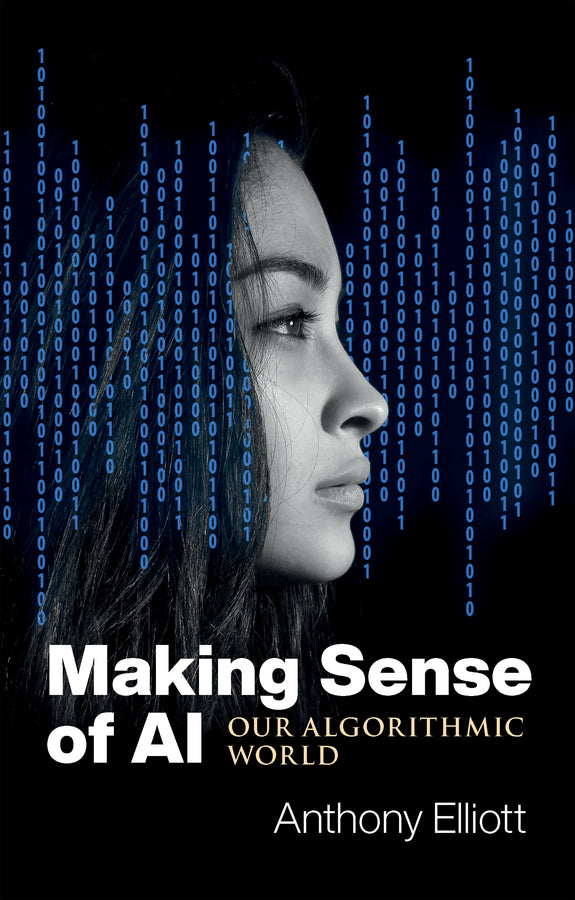Description
Discover the essential guide to understanding artificial intelligence with 'Making Sense of AI.' This enlightening book delves into the transformative world of AI technologies, from industrial robots and self-driving cars to customer-service chatbots and algorithmic predictions by major tech giants. With a focus on the economic, political, social, and cultural ramifications of AI, Elliott provides a thorough examination of the controversial issues arising from these advancements. Readers will gain insight into the automation of workforces, the peril of surveillance capitalism, the ethical dilemmas of warfare and lethal autonomous weapons, and the emergence of biased algorithms that perpetuate social inequalities.
This comprehensive exploration also addresses the critical role of AI in navigating global challenges, including pandemics like COVID-19, climate change, and energy security. 'Making Sense of AI' is designed for both novices and those seeking deeper knowledge, making it an ideal resource for students in the social sciences and humanities, as well as general readers. Get your copy today and unravel the complexities of artificial intelligence.
Note: Shipping for this item is free. Please allow up to 6 weeks for delivery. Once your order is placed, it cannot be cancelled. Condition: BRAND NEW | ISBN: 9781509548903 | Year: 2021 | Publisher: John Wiley & Sons (UK) | Pages: 220.
Note: Shipping for this item is free. Please allow up to 6 weeks for delivery. Once your order is placed, it cannot be cancelled.
Condition: BRAND NEW
ISBN: 9781509548903
Year: 2021
Publisher: John Wiley & Sons (UK)
Pages: 220
Description:
Industrial robots, self-driving cars, customer-service chatbots and Google™s algorithmic predictions have brought the topic of artificial intelligence into public debate. Why is AI the source of such intense controversy and what are its economic, political, social and cultural consequences?
Tracing the changing fortunes of artificial intelligence, Elliott develops a systematic account of how automated intelligent machines impact different spheres and aspects of public and private life. Among the issues discussed are the automation of workforces, surveillance capitalism, warfare and lethal autonomous weapons, the spread of racist robots and the automation of social inequalities. Elliott also considers the decisive role of AI in confronting global risks and social futures, including global pandemics such as COVID-19, and how smart algorithms are impacting the search for energy security and combating climate change.
Making Sense of AI provides a judiciously comprehensive account of artificial intelligence for those with little or no previous knowledge of the topic. It will be an invaluable book both for students in the social sciences and humanities and for general readers.
This comprehensive exploration also addresses the critical role of AI in navigating global challenges, including pandemics like COVID-19, climate change, and energy security. 'Making Sense of AI' is designed for both novices and those seeking deeper knowledge, making it an ideal resource for students in the social sciences and humanities, as well as general readers. Get your copy today and unravel the complexities of artificial intelligence.
Note: Shipping for this item is free. Please allow up to 6 weeks for delivery. Once your order is placed, it cannot be cancelled. Condition: BRAND NEW | ISBN: 9781509548903 | Year: 2021 | Publisher: John Wiley & Sons (UK) | Pages: 220.
Note: Shipping for this item is free. Please allow up to 6 weeks for delivery. Once your order is placed, it cannot be cancelled.
Condition: BRAND NEW
ISBN: 9781509548903
Year: 2021
Publisher: John Wiley & Sons (UK)
Pages: 220
Description:
Industrial robots, self-driving cars, customer-service chatbots and Google™s algorithmic predictions have brought the topic of artificial intelligence into public debate. Why is AI the source of such intense controversy and what are its economic, political, social and cultural consequences?
Tracing the changing fortunes of artificial intelligence, Elliott develops a systematic account of how automated intelligent machines impact different spheres and aspects of public and private life. Among the issues discussed are the automation of workforces, surveillance capitalism, warfare and lethal autonomous weapons, the spread of racist robots and the automation of social inequalities. Elliott also considers the decisive role of AI in confronting global risks and social futures, including global pandemics such as COVID-19, and how smart algorithms are impacting the search for energy security and combating climate change.
Making Sense of AI provides a judiciously comprehensive account of artificial intelligence for those with little or no previous knowledge of the topic. It will be an invaluable book both for students in the social sciences and humanities and for general readers.

